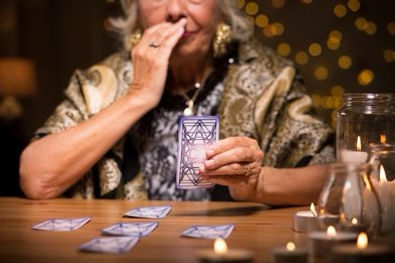
We often read about laws against witchcraft—the Salem trials were perhaps the best known, but there were many others. Even today, there are laws in some parts of the world against the practice of witchcraft. In some countries, it's even punishable by death. But what about in the United States? Are there any American laws against witchcraft?
Did You Know?
In some states there are laws against fortunetelling, Tarot card reading, and other divinatory practices, to protect gullible residents from being swindled by con artists.
There have been cases in the United States where specific religious practices have been challenged in court.
If you are a practicing Pagan, it's important to be aware of your rights as a parent, as an employee, and even as a member of the United States military.
Colonial Laws and Trials
sphraner / iStock / Getty
The Salem witch trials were indeed held in Massachusetts. However, in 1692, when these trials took place, Massachusetts was not "American" at all. It was a British colony, and therefore fell under British rule and law. In other words, the Salem Colony was not American in 1692, because "America" didn't exist. In fact, it didn't exist until about eighty years later. Also, no one has ever been burned at the stake for witchcraft in America. In Salem, a number of people were hanged, and one was pressed to death.
It is unlikely that any of those people were actually practicing any sort of witchcraft (except possibly Tituba), and more likely that they were all just unfortunate victims of mass hysteria.
Thirty years prior to Salem, in 1662, a similar trial took place in nearby Hartford, Connecticut, although it was certainly on a smaller scale. Four people were executed for the crime of witchcraft—but again, this was during the Colonial period, so these were not truly American laws.
Modern Laws
KatarzynaBialasiewicz / Getty Images
In some states, however, there are still laws against fortunetelling, Tarot card reading, and other divinatory practices. These are not outlawed because of an injunction against witchcraft, but because of municipal leaders trying to protect gullible residents from being swindled by con artists. These ordinances are passed on local levels and are typically part of zoning regulations, but they're not anti-witchcraft laws—they're anti-fraud laws.
In addition, there have been cases in the United States where specific religious practices have been challenged in court. In 2009, Jose Merced sued the city of Euless, Texas, when they told him he could no longer perform animal sacrifices as part of his religious practice. The city told Merced, a practitioner of Santeria, that "animal sacrifices jeopardize public health and violate its slaughterhouse and animal cruelty ordinances." The 5th U.S. Circuit Court of Appeals in New Orleans said the Euless ordinance "placed a substantial burden on Merced's free exercise of religion without advancing a compelling governmental interest."
Again, this was not a specific injunction against witchcraft or religion. Because it was a specific religious practice, and the city couldn't provide enough evidence to support their claim of it being a health issue, the court ruled in favor of Merced and his right to practice animal sacrifice.
In the 1980s, the District Court of Virginia court recognized witchcraft as a valid and legitimate religion, in the case of Dettmer v Landon, and this was upheld later on by a Federal court, determining that people who practice witchcraft as a religion are entitled to the same Constitutional protections as those who follow other belief systems.
How to Protect Yourself
Classen Rafael / EyeEm / Getty
Believe it or not, Pagans—and other practitioners of earth-based faiths—have the same rights as everyone else in this country. If you are a practicing Pagan, learn about your rights as a parent, as an employee, and even as a member of the United States military:
Protect your legal rights: If you suspect you may be a victim of religious discrimination, be sure to document everything that takes place. Keep a diary of any conversations or events that take place, as they happen. Finally, understand that there is a difference between discrimination and people just being opinionated. Religious discrimination takes place when you are denied the same rights as other people, on the basis of your religion.
Your rights as a pagan parent: If your child attends a public school in the United States, he or she has the same rights as other students. Keep in mind that many—probably most—teachers have never had a Pagan student, or had a Pagan parent to interact with. This means you'll probably be setting a precedent for them, and navigating the waters can be tricky. This is why, as always, communication is key. If your child comes home and says that his teacher said something that you find troubling, your first response should NOT be to complain to the school board, your lawyer, and the local news channel. Instead, start with the teacher.
Rights in the workplace: If you are suddenly facing the threat of termination after coming out of the broom closet, despite an excellent work history, you should contact a civil rights attorney who specializes in Pagan and Wiccan discrimination cases. Be sure to document every single conversation and event that takes place.
If you or someone you love is an active duty member of the military, you need to be aware of your rights as a Pagan or Wiccan soldier. If regular military channels do not resolve the issue you still have a couple of other options. You can file a complaint through the Inspector General (IG). The IG has the responsibility of investigating complaints and enforcing regulations. If neither of these works for you, consider filing an Article 138 complaint
source:
https://www.learnreligions.com/american-witchcraft-laws-2562884
Comentários